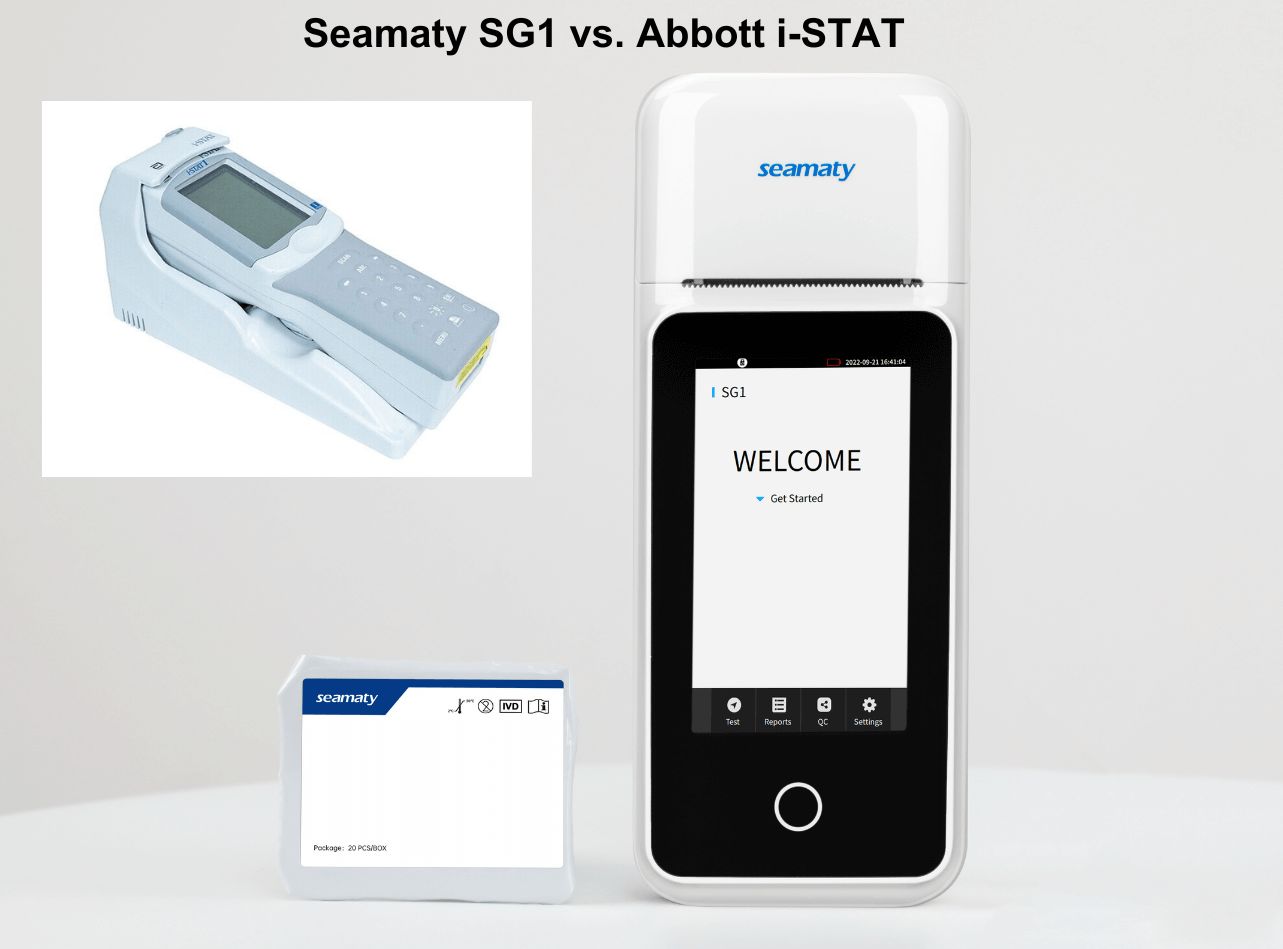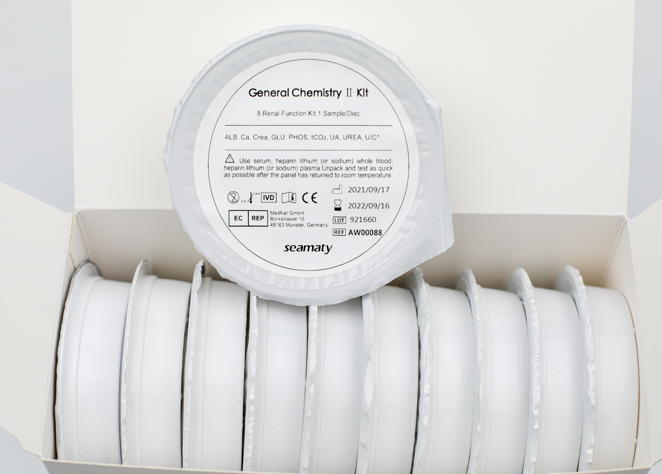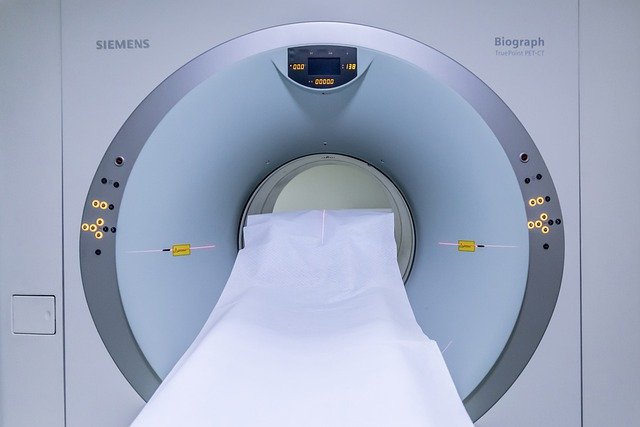release time:2023-05-08 09:11:22
Point-of-care testing has become a vital part of healthcare delivery, especially in critical care situations. Blood gas and electrolyte analysis is an essential component of critical care, as it helps to evaluate a patient's respiratory and metabolic status. The Abbott i-STAT is a widely used blood gas analyzer that has been a popular choice for point-of-care testing in many healthcare facilities. However, the high cost of the instrument and reagents has made it difficult for many healthcare providers to adopt this technology. The Seamaty SG1 blood gas&electrolyte analyzer presents a cost-effective alternative to the Abbott i-STAT, without compromising on quality or performance.
The Seamaty SG1 combines microfluidic and microbiosensing technologies to enable blood gas and electrolyte testing in a mini-testing instrument. It is a handheld blood analyzer that allows blood gas testing and electrolyte testing in one device, and offers many features that make it an ideal choice for point-of-care testing. Some of the key features of the Seamaty SG1 include:
Now let's take a closer look at the Seamaty SG1 blood gas analyzer and its advantages over the Abbott i-STAT.
Firstly, the Seamaty SG1 analyzer combines microfluidic and microbiosensing technologies, which enables blood gas and electrolyte testing in a mini-testing instrument. This technology reduces the number of reagents and achieves the purpose of reducing the cost of testing, which can help hospitals achieve maximum profitability while saving patients. In contrast, the Abbott i-STAT uses a cartridge-based system that requires a significant number of reagents, making it more expensive to operate.
Secondly, the Seamaty SG1 analyzer uses disposable reagent consumables that avoid repeated loss of electrode pieces and make the test results more accurate. On the other hand, the Abbott i-STAT uses reusable cartridges that require constant calibration and maintenance, which can lead to inaccurate results and higher costs.
Thirdly, the Seamaty SG1 analyzer has a high-definition full-color large-screen operating interface and an intelligent operating system that allows operators to have a better experience. This makes it easy to use for healthcare professionals, reducing the likelihood of errors and improving efficiency. The Abbott i-STAT, on the other hand, has a smaller screen and a less intuitive interface, making it harder to operate.
Fourthly, the Seamaty SG1 analyzer is portable and weighs only 600g, making it easy to use on the patient's side. It has a built-in large-capacity lithium battery that can support 60 cartridges testing completed. In contrast, the Abbott i-STAT requires a power source and is not as portable, limiting its use in certain situations.
Finally, the Seamaty SG1 analyzer provides rapid results, with test results available in just 4 minutes. This allows healthcare professionals to make timely decisions and improves patient care. The Abbott i-STAT also provides fast results, but the Seamaty SG1 has a smaller sample volume requirement, only 100μL of whole blood is required for a single test.
|
Features |
Seamaty SG1 |
Abbott i-STAT |
|
Handheld design |
Yes |
Yes |
|
Blood gas & electrolyte test |
Yes |
Yes |
|
Microfluidic technology |
Yes |
No |
|
Disposable reagent consumables |
Yes |
No |
|
Testing Time |
4 minutes |
2-3 minutes |
|
Sample Volume |
100 μL |
95-250 μL |
|
Number of Parameters Tested at One Time |
10 |
8 |
|
Calibration |
Triple calibration |
Dual calibration |
|
Screen |
Full-color large screen |
Small screen |
|
Cost-Effectiveness |
Yes, due to microfluidic technology and disposable reagent consumables |
Yes, due to reduced laboratory testing costs |
|
Price |
Affordable |
Expensive |
In conclusion, the Seamaty SG1 analyzer is a cost-effective alternative to the Abbott i-STAT, with its microfluidic and microbiosensing technologies, disposable reagent consumables, high-definition full-color large-screen operating interface, portability, and rapid results. It is an excellent choice for point-of-care and laboratories in different situations. Healthcare professionals can benefit from its easy-to-use design, accurate results, and fast turnaround time, ultimately improving patient care. If you are looking for a blood gas and electrolyte analyzer for critical care, the Seamaty SG1 is definitely worth considering.

2023-05-23
Discover the essential steps to become a successful distributor of POCT medical equipment. Learn about market research, sourcing quality products, strategic marketing, and building strong relationships. Partner with Seamaty, a trusted global provider, to access premium POCT equipment. Start your journey to success today.

2022-03-23
The "5 CRP Kit" contains tests for AMY, Crea, UREA, LPS, CRP. The "AMY & LPS" tests are specifically designed to detect normal pancreatic function.

2022-02-17
Previous articles have talked about the role, principles and differences of DR, ultrasound and CT respectively. What is the difference between them and MRI? Read on!